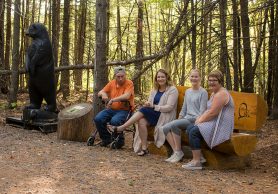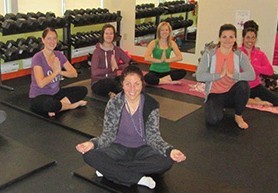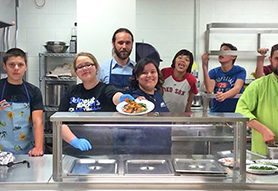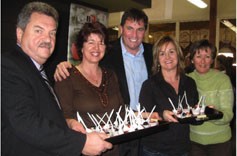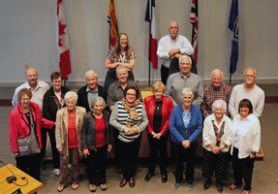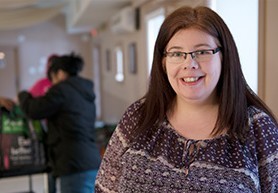Stories of inspiration
from people just like you...
How a unique community approach is reducing food insecurity while increasing wellness
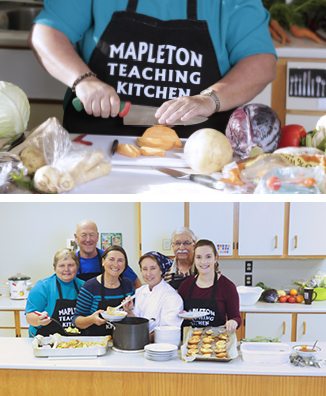
What’s cooking at the Mapleton Teaching Kitchen? A recipe for success to help enhance food security in the area! This innovative community organization has found a unique way to provide families in need from the neighbourhood with regular, affordable access to healthy food, and a place where they can find the support to develop the skills and confidence they need to prepare nutritious meals at home.
For many of these families, having enough food is a challenge and they often eat the same foods that are both available and affordable. These are often prepared foods that are high in salt and fat.
“Once people learn how to make meals with healthy ingredients while staying within their budget, they start to feel better and think more clearly, and when they realize that what they put into their bodies makes a difference, they want to eat healthy and aren’t afraid to try new things,” says Janet Hamilton, Coordinator of the Mapleton Teaching Kitchen. “But it all depends on building trusted, long-term relationships with participants.”
These relationships are forged thanks to the exceptional programs that the Mapleton Teaching Kitchen offers in partnership with numerous community organizations.
Programs include Fresh for Less, where members can sign up to receive a box filled with fresh fruit and vegetables every month at an affordable price. Boxes are packed by volunteers and even delivered to places like seniors complexes.
But having access to fresh food is one thing. Having the confidence and skills to cook a meal from scratch using ingredients you are not familiar with is another. This is where the “teaching” part of the “teaching kitchen” comes into play. Many of the programs offered develop cooking skills in kids, adults and seniors alike.
For example, the One Pot Meal program teaches kitchen safety, cleanliness and proper cooking techniques, but also shows participants how to cook a meal in one pot that is healthy and nutritious using food commonly available at the food bank. From this four-week foundational program, participants can graduate into the Collective Kitchens program. Now that they know their way around a kitchen, this program allows them to make 2 to 3 healthy meals together that they can then purchase for $1.50-$2.00 a portion. “Some people will buy 6 to 8 portions,” notes Janet. “That will be their food for the week.”
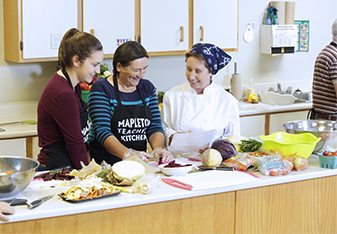
Participants pick out recipes they want to try.
Programs can be done onsite but a mobile kitchen is also available to run the programs in places like senior complexes, often with the help of Community Food Mentors, a province-wide network of certified individuals who share their skills in food and nutrition within their communities. “Eating can be a really social thing, especially if people live alone,” says Janet. “Some participants wouldn’t eat, or at least not well, if they didn’t have this program.”
And from seniors to youth, there’s something for everyone. The Fun in the Kitchen summer camp is a version of Collective Kitchens, but designed specifically for kids. Each day, these children go home with a newsletter outlining what they did that day, including recipes they made so they can make the meals with their parents later. The kids’ enthusiasm over cooking with new healthy ingredients spreads to everyone else at home. And learning these skills at an early age is a great foundation for their future!
“Kids come back year after year and get really excited about cooking,” says Janet. “And they learn math skills when they have to measure out ingredients and reading skills with the recipes. Plus it encourages the whole family to get involved in cooking.”
Serving the community however, does come with its challenges, especially when it comes to sourcing ingredients and providing meals that are both economical and healthy – a challenge Janet, who is a chef, nutritionist and master canner, is always looking to overcome. She’ll regularly scour the food bank shelves to get ideas for recipes to make the most nutritious meals possible out of the ingredients available. She also takes advantage of the picking season to make things like homemade tomato sauce and baked beans that she can also give back to the food bank because she understands the impact good, nutritious food can have.
“A lot of people don’t associate what they put in their body with how they feel. If you put junk in, you’ll feel bad. Put healthy food in, you’ll feel better about yourself.”
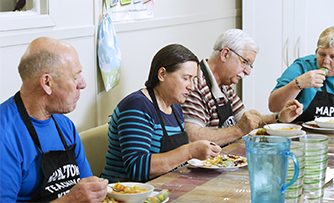
Friendships develop as participants share meals.
And participation in the program is empowering. “We had one participant who used to barely come out of the house,” notes Janet. “Now she participates in our programs, volunteers and feels comfortable and welcome here, which is really important.”
Janet’s love for cooking also carries over into her teaching. “I love to teach people how to cook, even if it’s a simple little thing. We’ve had participants come into the kitchen and one of the first things I’ll ask is what they would like to learn to cook. And I’ve had people say a baked potato, which is something we think is easy, but it isn’t for them because they’ve never done it. For me, it’s really important to build that trust so they feel like they can ask any question they want.”
While the program is doing great work, Janet also realizes it’s just the tip of the iceberg. She’d like to get the word out to more low-income families that these programs are available, so they know there is support in their community that can provide regular access to fresh, healthy food and a warm, caring environment where they can learn how to prepare it themselves.
The program’s success is food for thought on how this approach can be adopted to create environments in more communities that support families in need to feel empowered to make healthier choices. And the Mapleton Teaching Kitchen is a shining of example of how it can be done.
Feeling inspired?
Well it's time to take the next step! Find the resources you need to start your wellness story here!

